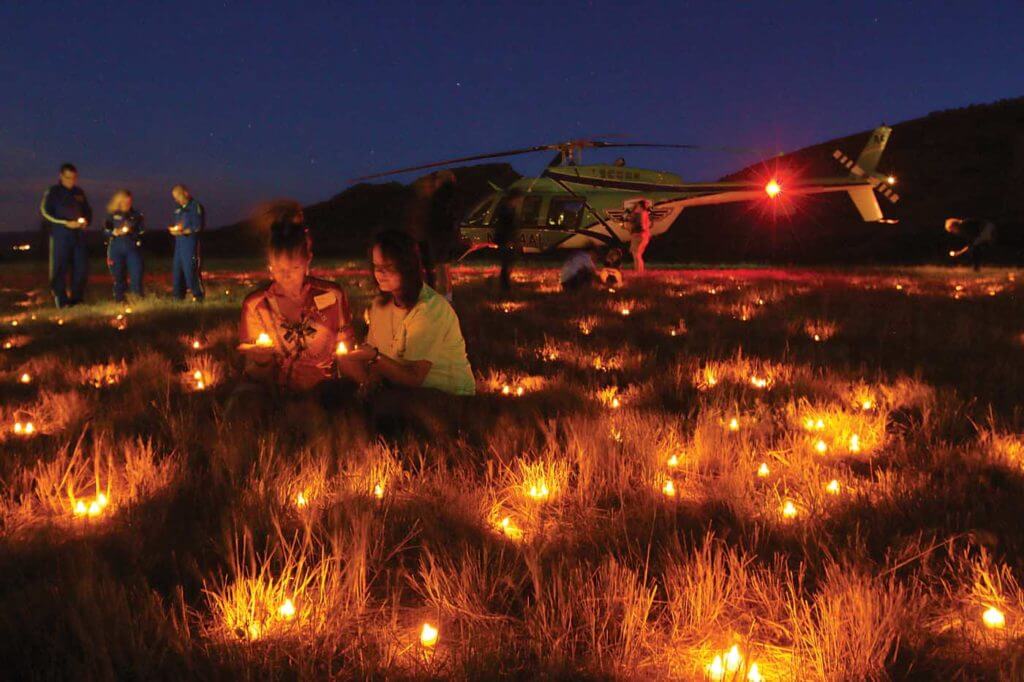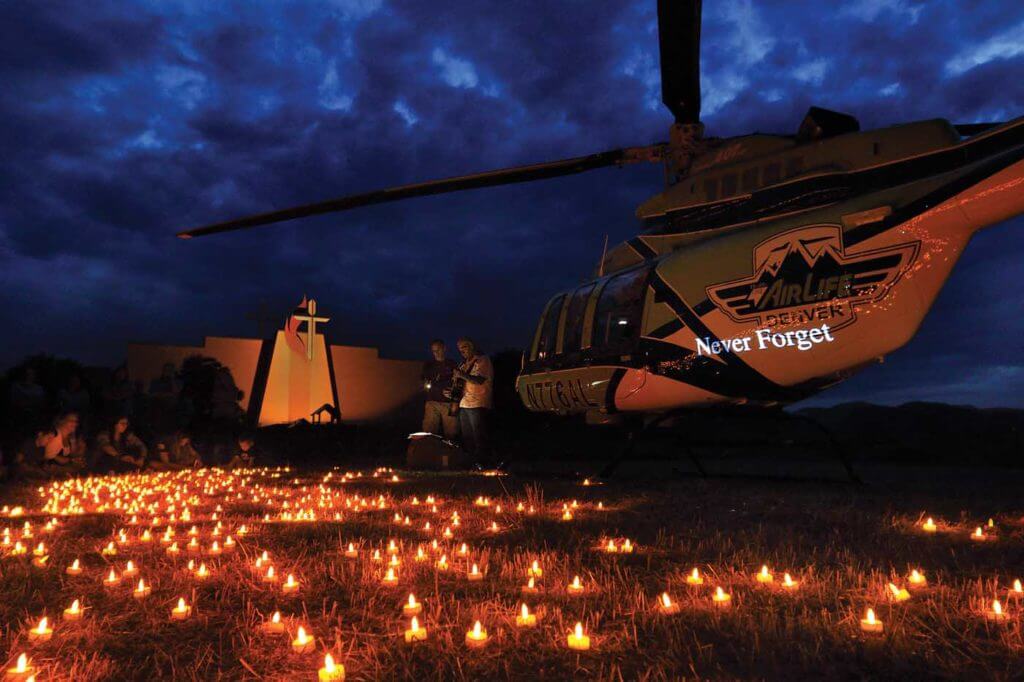Editor’s Note: This is part 2 in a two-part series by Daniel J. McGuire, a board-certified grief educator and counselor who works with emergency response agencies to prepare for losses within their organizations. Read part 1, which appeared in the Summer issue of Vertical 911, here.
All too often when there is a line of duty death (LODD) in an emergency services agency, our instinct as first responders is to take charge of the situation in a desire to honor our deceased colleague. However, as I mentioned in the first part of this series, that instinct can lead to us pushing aside the employee’s surviving family — a serious misstep that can result in damage and disruption before we realize what is occurring.

A primary rule when dealing with any employee’s death, be it a LODD or the death of an employee off duty, is that the surviving family is your number one concern. It is imperative to make sure that there is no “running over” the family with the agency’s well-intentioned ideas for bereavement and remembrance activities. I repeat, the surviving family’s wishes simply have to come first and foremost in all of our thoughts and actions.
A highly important and visible position in any LODD pre-plan is going to be the family liaison (FL). The FL position is not, nor should it ever become, a decision-making position — that is not your job. Instead, the FL serves as the primary contact between the surviving family and agency leadership for all wake, funeral, and memorial arrangements. Also, the FL ought to help guide and advise the surviving family on traditional commemorations, tributes, and funeral traditions in the public safety sector.
The FL should be someone from your agency who is well known and respected, who has excellent communication skills and the ability to think on their feet, and who won’t fall into the well known trap of “over-promise, under-deliver.” The surviving family does not need or want multiple calls from agency representatives suggesting funeral and memorial ideas beyond what was originally written on the employee’s emergency contact form (ECF). That is why the ECF, which I addressed in part 1 of this series, is all important, since it contains decisions and requests from the employee that should be followed as closely as possible.

The FL must become and remain the single point person between the surviving agency and the surviving family throughout the LODD event. The FL ought to be a “one-stop” resource for the surviving family and all communications, of any type, to and from the surviving family ought to go through the FL so the family is not overwhelmed with offers from well-meaning agency representatives. This line of communications must remain organized, closed looped, and effective for the surviving family’s needs and wants.
The FL will be with the family, offering whatever support they desire. Sometimes the family will ask the FL to be at their home to answer the phone and take messages in the first several hours or longer after the death is confirmed. Many well intentioned people will be calling to extend their sympathy, offer support, ask if any food can be brought over, etc., and the surviving family simply may not be ready for or want to take those calls for the first 12 to 24 hours.
One very important caution: the FL will be exposed to the surviving family’s raw grief, unfiltered anger, and other visceral emotions. Witnessing these reactions can be physically and emotionally taxing, especially since the FL will have their own personal grief to contend with. For this reason, it may be beneficial to have two agency members assigned on a 12-hour-on, 12-hour-off rotational basis. A rotational schedule should be planned and completely discussed with the surviving family to get their understanding and approval. If there will be two FLs, be sure the surviving family has cell phone and other contact numbers for both of them so they feel empowered to contact one or the other at any given time.

The FL should also be working with the agency’s subject matter experts to address other important tasks that need to be covered. For example, will the surviving family require assistance in arranging transportation for extended family members and friends flying in from out of town? The FL does not need to be directly involved in all of these supporting tasks — a transportation subgroup reporting to the FL can handle the details.
Be prepared to support the surviving family not just in the immediate aftermath of a LODD, but also long after their loss. As I frequently emphasize, “This isn’t over when you depart the cemetery.” Surviving employees will also need support and understanding in the weeks and months to come. This may require that some employees receive additional time off duty as they process the death event and their personal sense of loss. In particular, because FLs are so intimately exposed to the surviving family’s reactions of grief, hurt, and sorrow — in addition to coping with their own reaction to the event — they should be offered some type of peer support or other counseling once they are done with their immediate assignments.
Reactions to grief
As a board certified grief counselor, I want to take a moment to prepare you for the fact that you may be surprised or even puzzled by the reactions you notice in yourself, your colleagues, and the surviving family following a LODD.

You may have worked with your crewmembers and other agency personnel for many years, and feel that you know them very well. However, a line I use often when teaching stress and grief programs is: “A sudden death can change the closest of friends in less than a moment.”
A LODD can trigger unpredictable reactions that can evoke surprise or even anger between people with previously solid professional relationships. Some of these unpredictable reactions can manifest as deep sadness, anger, or questioning the safety of one’s job, which often leads to an erosion and disruption of one’s work habits. It should also be well noted that when an agency goes through a LODD event, subsequent employee attrition is usually directly related to how well the event was managed. This can have an impact on current and future flight operations.
 A note on grief reactions: sudden, traumatic tragedies can and will affect everyone with feelings of significant loss, depressive thoughts, and disbelief. There should be no expectation that people closely affected by the loss should “be strong” or “keep their head up.” Moreover, we all have our own ways of expressing our grief and bereavement. Therefore, no one should be made to feel that their showing of grief is not normal when compared to others. Your reactions are just that — yours — and should not be judged by anyone else.
A note on grief reactions: sudden, traumatic tragedies can and will affect everyone with feelings of significant loss, depressive thoughts, and disbelief. There should be no expectation that people closely affected by the loss should “be strong” or “keep their head up.” Moreover, we all have our own ways of expressing our grief and bereavement. Therefore, no one should be made to feel that their showing of grief is not normal when compared to others. Your reactions are just that — yours — and should not be judged by anyone else.
Also, there is no “foot race” or specified timeline for our individual grief paths ahead. Yes, some people will seem to recover and metabolize faster than others, but that doesn’t mean they are the “stronger” ones. We all need to follow our own grief path that suits our past losses, other traumas, our cultures, and customs that we have developed over our lives.
There is a strong cultural barrier in the United States and some other parts of the world that prevents us from talking openly about end of life issues, facing them, and planning for them. This means that for many of us, the entire category of death is rarely talked about and poorly understood. There are many resources that can help your agency cope with varied grief reactions, including literature from your local funeral home director or religious leader and industry specialists.

The ultimate questions for any agency in the aftermath of a LODD event are: “Did we do it right?” and “Did we do enough?” The only way to be prepared to answer these questions in the affirmative is, “Get to work, now!” If you don’t already have a comprehensive LODD pre-plan, then I ask and implore each of you as leaders in your flight operations to take this matter to the top of your current priority lists. Too late is merely that — too late.






Thank you Vertical 911 magazine for publishing this series of LODD articles. I hope both aricles give all agencies who have read the series, some solid steps ahead to take on and prepare for the moment in which we hope never strikes our agency.